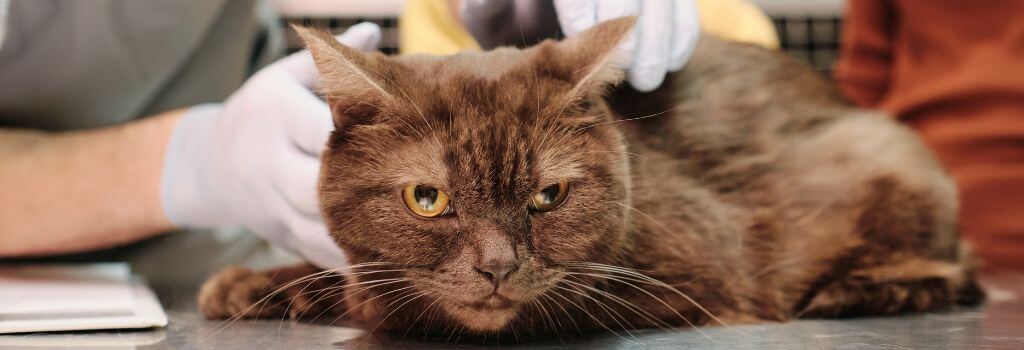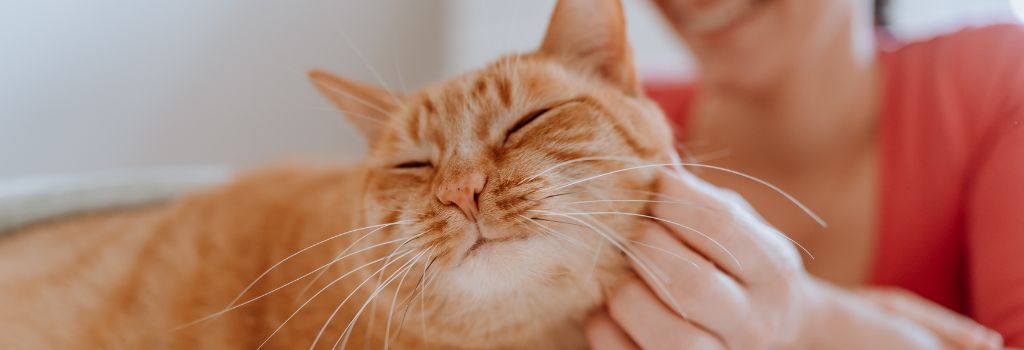Cats are true masters of disguise, fitting into the smallest spaces, concealing themselves in hard-to-find places, and even hiding their pain from their owners. It can be quite challenging to tell when your feline friend needs a bit of medical attention. This may explain why more than 90% of dog owners make sure to take their pups to the vet each year, while only around 40% of cat owners do the same.
The truth is, just like dogs, cats need regular checkups to stay healthy and catch potential issues before they become serious. Let’s take some time to dig into why annual checkups are just as important for cats as they are for dogs and what to expect during your visit to Orchard Road Animal Clinic’s feline-only clinic.
Two Important Factors to Remember About Cats
Cats Age Faster Than Humans
Cats age much faster than we do, so when they miss a vet appointment, it’s like skipping years of important health care for ourselves. Just one year in a cat’s life is similar to several years for humans, which makes their annual visits even more crucial. Regular exams with your cat’s veterinarian help us get a better understanding of your cat’s baseline health. Knowing what’s “normal” for your pet will help us recognize what’s “abnormal,” address new issues earlier, and stay ahead of potential health concerns.
Cats Are Experts at Hiding Illness
Unlike dogs who can be a bit dramatic (but we love them so much anyway!), cats are incredibly skilled at masking signs of discomfort. In the wild, showing weakness makes them vulnerable, so they instinctively hide symptoms of illness or pain. This means that by the time a cat outwardly shows signs of being sick, the condition may already be advanced. Bringing your cat in for regular wellness exams allows your veterinarian to detect subtle health changes before they become serious problems for your pet.

How Often Should My Cat Have an Exam?
While annual exams are the standard for most adult cats, kittens, senior cats, and those with chronic health conditions may need more frequent visits:
- Kittens (under 1 year): Just like human babies, kittens need frequent exams to check they’re growing at a healthy rate and that they get their vaccines and boosters properly. Expect multiple visits throughout their first year for vaccinations, deworming, and wellness checks.
- Adult Cats (1-7 Years): Even if your cat seems perfectly healthy, an annual wellness exam is essential. This is the time to catch any potential health concerns early, discuss nutrition and behavior, and support your cat’s overall wellness with routine lab work and vaccinations.
- Senior Cats (8+ Years): As cats age, they become more prone to conditions like kidney disease, arthritis, hypothyroidism, and dental issues. To monitor these changes and provide the best care possible, semi-annual checkups are recommended for senior cats.
So, if your cat hasn’t been to the vet in a while, it might be time to schedule that wellness exam!
What Happens During a Cat Wellness Exam?
A feline wellness exam covers seven essential health checkpoints to make sure your feline is in good health. These exams play an important part in catching any potential health issues early on and give you the chance to discuss any concerns you may have regarding your cat's behavior, nutrition, or overall lifestyle.
The seven key areas of a feline wellness exam include:
- Comprehensive Physical Examination: Typically, exams start with a thorough evaluation from head to tail, checking your pet's overall body condition, coat quality, and the health of their eyes, ears, nose, and skin for any signs of abnormalities. During this, your veterinarian gently palpates the abdomen and musculoskeletal system to spot any irregularities in organ size, muscle tone, or joint function.
- Behavior and Lifestyle Discussion: Your veterinarian will discuss behavioral patterns, activity levels, and your pet’s environment to pinpoint any potential issues related to stress, anxiety, or underlying medical conditions that could impact behavior.
- Nutritional and Weight Assessment: Proper nutrition significantly influences a cat's overall health. Your pet will be weighed, and the veterinarian will assign a body condition score to make sure dietary recommendations match the cat’s age, lifestyle, and metabolic requirements.
- Oral Health Evaluation: Dental disease is incredibly common in cats, with most experiencing issues by age four. Your pet will be checked for signs of discomfort, plaque buildup on teeth, or oral abnormalities.
- Laboratory Testing: A simple blood and urine test can provide valuable insights into your cat’s internal health. This will help your vet catch conditions like kidney disease, infections, or diabetes early.
- Parasite Screening & Prevention: All pets, even indoor cats, can be at risk for parasites like fleas, ticks, and intestinal worms. A stool sample will be collected for analysis, and we will discuss the best preventive care for your cat's lifestyle and health.
- Vaccinations & Preventive Care: Vaccination requirements and needs will change based on age, lifestyle, and risk factors in your particular area. A vaccination schedule is developed, and additional preventive care measures, such as deworming and routine screenings, are discussed to optimize long-term health.
Making the Vet Visit as Stress-Free as Can Be
One of the main reasons pet owners hesitate to take their cats to the vet is the stress it can cause their pets. Unfortunately, this is often true; veterinary visits can lead to anxiety for many cats. However, proper preparation can make the experience much more manageable for all involved. A good starting point is to familiarize cats with their carrier well in advance of the appointment. Instead of using the carrier only for trips to the clinic, keep it in a familiar area at home, filled with soft bedding, toys, or treats to allow your pet to explore it any time they’d like. This will help untangle the idea that “carrier means doctor!”
Choosing a cat-friendly clinic is important, and opting for a cat-only clinic can be even better for our pets… and ourselves as their owners. These clinics are quiet, dog-free environments that minimize stress caused by loud noises and the unfamiliar, stinky smells of their not-so-relatable four-legged friends – dogs.
To help cats stay calm, calming aids such as pheromone sprays or special treats designed to reduce anxiety may be helpful during the car ride and exam. Pheromone diffusers are often used in exam rooms to continue the easygoing experience. Speaking in a soothing voice and handling cats gently during the trip can also ease their nerves. These small tweaks can make a big difference in helping cats feel more comfortable in new surroundings.

Prioritizing Your Cat’s Health
Caring for your cat involves more than simply providing a litter box, food, and a comfortable sunny spot. Regular veterinary exams form the basis for their overall health. By committing to annual veterinary visits and working with a team that values a stress-free experience, pet owners can overcome obstacles that often prevent cats from getting the care they actually need.
Every visit to the vet, whether it’s a kitten’s first appointment or a senior cat’s bi-yearly exam, is a chance to support your cat’s health. Taking a proactive approach to feline healthcare means that more cats can enjoy longer, healthier lives—just as they deserve!
Remember, routine exams are just as important for cats as they are for dogs!
If you have questions and you'd like to reach out to us, you can call us directly at (941) 253-5218, or you can email us at staff@uacvet.com. Don't forget to follow us on social media Facebook, Instagram.
